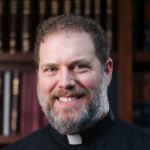
Back in my Episcopalian days in the Deep South, I remember hearing a fascinating conversation between a mother and son on their arrival at church. The son was asking his mother about why they came. She began to tell him about how they come to learn about God, but he stopped her and says, “But mom, I already like God!”
There’s no special wisdom in this statement, just honesty. If you don’t believe in the holy sacrifice of the Mass, if you don’t believe in the Sunday obligation, if you think Christianity is just having a friendly attitude toward God and other people, it makes sense that, in the long list of priorities, it should fall somewhere below cleaning the house, helping the kids do homework, playing golf, and spending time with family. When all those other things are in order, and we happen to be well rested and not too busy, maybe we can make it to church. And what’s wrong with that? I mean, we already like God.
Is it our job to make people like God? That is, I suppose, one model of ministry, represented well by Amaziah in our reading from Amos. He is a court priest. His job is to fill the king’s ears with happy religious support. His job is to keep the peace in the name of God, or the gods, or whatever convenient powers happen to be at hand. And in today’s passage, that means rebuking the true prophet, Amos. Go back to Judah where you belong, he says. Maybe they’ll appreciate your prophecy there.
But for Amos, unlike Amaziah, this isn’t about personal gain; it’s about the truth. He is, by his own testimony, not a professional: he doesn’t come from one of the prophetic dynasties or the formal groups of prophets devoted to Scripture and prayer. He is not so different, maybe, from the disciples in today’s passage from Mark, where the Lord sends them out two by two. How are they prepared for this mission? By years of training and discipline, by mastering the latest evangelistic techniques and rhetorical styles? None of the above. Their preparation consists of simply watching and listening to Jesus. Their instructions do not include a complicated playbook or set of quotas—just a reminder to keep moving and not worry too much about it if they’re not welcome. Their goal, too, isn’t just to make people like God, but to lead people from shadows into truth, from knowledge to worship.
Let’s bring this back to the present. You already like God. Good. But our job, yours and mine, is not to like God, or even just to know God, but to worship God. Worship literally means to ascribe worth to something or someone. In our beautiful marriage rite, a man says to his wife, when putting on the ring, “With this ring, I thee wed; with my body, I thee worship.” To worship God is to live in such a way as to make it clear, to ourselves, and to others, that God is the source of all worth, all value, all goodness. Worship is a whole way of life. It flows from the altar, through the church, and out into the world. Worship is putting our loves in order; it is arranging our priorities and our lives—from our heads to our wallets to our loins to our feet—in a way that shows that God is the most important thing.
For Amos and the other prophets, worship is the end game. Modern people love quoting the prophets about justice, but injustice, for the prophets, is a problem precisely because it disrupts worship, because it suggests the finality of a world without God, a world without meaning or relationship. Justice is having everything in order—which is to say it is much more than punishment or prevention. The just world is a world ordered and oriented to worship. Worship is what we are for. It is why we were made. In the philosophical way of putting it, it is our final cause: our “meaning of life.”
There is probably no better way in this world to be prophetic than to act as if worship is the most important thing in the world. Prophecy involves both action and word—the ability to name, at times, behaviors that disrupt the Church’s worship. Amaziah shows that priests are sometimes incapable of doing this themselves. Amos the prophet, however, is “a herdsman, and a dresser of sycamore trees.” He’s no cleric, that is. He’s a layman. But he is able to ask the right questions, the sorts of questions that laypeople today can and do still ask. What is the most important thing? Is it God, or is it not stepping on anyone’s toes? Is it God, or is it preserving capital? Is it God, or is it making life easier for ourselves? Is it God, or is it being safe?
You don’t need an advanced degree in theology to answer those questions. In fact, sometimes theologians (and I speak as one) can make things so complicated by nuance and distinction as to lose the point. God is the most important thing. Our lives find their ultimate meaning when they are shaped and ordered around the worship of God. So, despite the Amaziahs of this world telling us to stay in our own lane and not “force our religion” on people, we have to insist, like Amos, that actually all questions about justice and morality and human politics and economics come down to worship—in other words, to what we were created for. Those demanding that we keep “religion” out of the public square are declaring that, in order to talk about the journey, we have to forbid any discussion of the destination or why we are making the journey in the first place.
Whether we are called to the modern-day royal court, or to some other more ordinary place, Jesus sends us out on his business. The question isn’t whether we have all the right skills or the perfect techniques to win the day. The question is whether we are willing to go, or to be, where we are sent, trusting in our Lord—to reveal that the purpose of all things is only found in Christ.



